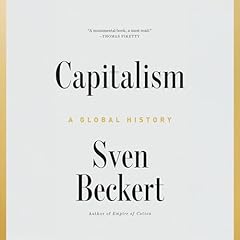
How Markets Fail
The Logic of Economic Calamities
No se pudo agregar al carrito
Add to Cart failed.
Error al Agregar a Lista de Deseos.
Error al eliminar de la lista de deseos.
Error al añadir a tu biblioteca
Error al seguir el podcast
Error al dejar de seguir el podcast
 Exclusivo para miembros Prime: ¿Nuevo en Audible? Obtén 2 audiolibros gratis con tu prueba.
Exclusivo para miembros Prime: ¿Nuevo en Audible? Obtén 2 audiolibros gratis con tu prueba.Compra ahora por $22.22
-
Narrado por:
-
Ralph Cosham
-
De:
-
John Cassidy
In How Markets Fail, John Cassidy describes the rising influence of what he calls utopian economics, thinking that is blind to how real people act and which denies the many ways an unregulated free market can produce disastrous unintended consequences. He then looks to the leading edge of economic theory - including behavioral economics - to offer a new understanding of the economy, one that casts aside the old assumption that people and firms make decisions purely on the basis of rational self-interest.
Taking the global financial crisis and current recession as his starting point, Cassidy explores a world in which everybody is connected and social contagion is the norm. In such an environment, he shows, individual behavioral biases and kinks - such as overconfidence, envy, copy-cat behavior, and myopia - often give rise to troubling macroeconomic phenomena, such as oil-price spikes, CEO greed cycles, and boom-and-bust waves in housing. These are the inevitable outcomes of what Cassidy refers to as "rational irrationality" - self-serving behavior in a modern market setting.
Combining on-the-ground reporting, clear explanations of esoteric economic theories, and even a little crystal-ball gazing, Cassidy warns that in today's economic crisis, conforming to antiquated orthodoxies isn't just misguided - it's downright dangerous. How Markets Fail offers a new, enlightening way to understand the force of the irrational in our volatile global econ...
©2009 John Cassidy (P)2009 Blackstone Audio, Inc.Los oyentes también disfrutaron:




















Reseñas de la Crítica
Las personas que vieron esto también vieron:
















The first idea is Keynesian economics which recognized that some markets possess positive feedback, which is inherently unstable. The Keynesian model suggested that a central role for governments was to intervene in order to partially stabilize these markets. However, this failed in part because market participants could adapt to the government intervention far faster than the government could adapt to market changes. The resulting combination of government intervention and a market that anticipates and accounts for government intervention is even more unstable, and has the added problem that wealth is sucked out of the government, to savvy market players.
The narrative suggests that the competing idea has been something that I will call ???Friedmonian??? economics, which argued that markets are nearly perfect information machines. This model leads naturally to a policy of extreme government abstention in all economic matters, which, leads to a kind of lawlessness. Perhaps you can???t (yet) bulldoze your competitor???s factories in the dead of night, but the economic equivalent of this is increasingly endorsed. This had led to a series of bubbles, where a savvy few (often in collusion) have bilked and swindled the economy as a whole. These frauds tend to actually destroy wealth, not just transfer it, so the result is decidedly not good for the whole, even in the statistical sense.
In the shadow of thesub-prime bubble, the two main economics schools are nearly wholly discredited.
The author is clearly somewhat sympathetic to the Keynesian theory; I???m too young to think of Keynesianisum as truly distinct from astrology. But I think that the idea of market efficiency is at least as silly, and I'm glad he's willing to say so.
My Pick for Best Book, 2010
Se ha producido un error. Vuelve a intentarlo dentro de unos minutos.
Must-read for everyone interested in economics
Se ha producido un error. Vuelve a intentarlo dentro de unos minutos.
Where does How Markets Fail rank among all the audiobooks you’ve listened to so far?
The book does a nice job of reviewing the history of markets and provides more detail towards the end about the events that occurred within the past couple of years.What did you like best about this story?
The detail within the past couple of yearsWhat does Ralph Cosham bring to the story that you wouldn’t experience if you just read the book?
A reminder of what happened and how we have been through this before.Was this a book you wanted to listen to all in one sitting?
No.A detailed history
Se ha producido un error. Vuelve a intentarlo dentro de unos minutos.
Way more than I expected
Se ha producido un error. Vuelve a intentarlo dentro de unos minutos.
Great audiobook: story and narrator.
Se ha producido un error. Vuelve a intentarlo dentro de unos minutos.


